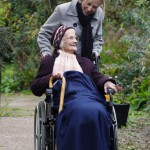Ontario winters can be harsh, with heavy snowfall, freezing rain, power outages, and sub-zero temperatures posing serious risks—especially for seniors. For retirement homes and senior residences, winter storm preparedness isn’t optional—it’s a critical part of resident safety. In this article, we explore how Ontario senior residences prepare for winter weather emergencies and which protocols help protect vulnerable residents during storms.
 Why Seniors Are Especially at Risk During Winter Storms
Why Seniors Are Especially at Risk During Winter StormsOlder adults are more vulnerable to cold weather and disruptions caused by winter storms due to:
Reduced body temperature regulation
Mobility challenges and fall risks on icy surfaces
Reliance on heat, power, and medical devices
Potential delays in medication, meals, or caregiver access
Risk of social isolation and anxiety during extreme weather
Without proper planning, a winter storm can quickly become a serious health and safety threat.
Ask questions regarding retirement homes to our experts
Retirement homes across Ontario follow a range of emergency protocols to ensure continuity of care and maintain resident well-being during ice storms, blizzards, or power failures.
| Emergency Measure | Implementation | Resident Benefit |
|---|---|---|
| Backup Generators | Automatic generators for heating, lighting, and medical devices | Maintains warmth, safety, and life-sustaining equipment |
| Emergency Supply Kits | Stocked with blankets, flashlights, medications, water, and food | Ensures care continues without interruption |
| Staffing Contingency Plans | Extra staff on-site during storm warnings; backup caregiver access | Guarantees sufficient help with meals, medications, and mobility |
| Weather Monitoring | Close tracking of Environment Canada alerts | Allows early preparation and activation of storm protocols |
| Communication with Families | Regular updates sent to loved ones before, during, and after storms | Promotes transparency and peace of mind |
Beyond emergency response plans, homes also take daily precautions during the winter season:
Salting and shoveling pathways to prevent resident falls
Indoor activity programming during severe cold or ice events
Monitoring of indoor temperatures to prevent hypothermia risks
Delivery arrangements for medications and essentials if roads are closed
These efforts ensure seniors remain safe, warm, and cared for regardless of the weather outside.
When choosing or reviewing a retirement home in Ontario, ask:
Do you have an emergency generator for heat and power?
How do you prepare for snowstorms, ice, or freezing rain?
Are there extra staff on-site during storm events?
How do you communicate with families during emergencies?
Are emergency supplies readily available for all residents?
Cold temperatures, power outages, slippery surfaces, and disruptions to medical care all increase health and safety risks for older adults.
Most licensed homes have backup generators or access to temporary power to keep essential services like heat, lights, and oxygen running.
They monitor weather alerts, stock supplies, schedule extra staff, secure transportation for emergencies, and prepare communication systems.
Yes. Most homes send proactive updates to families via phone, email, or SMS when severe weather disrupts regular routines or services.
Yes. Many work closely with local emergency response networks and hospitals, especially for medically fragile residents.
Don't hesitate to contact us at 343 309 5289 . We can help you choose the right establishment for you and assist you in your search.

Find a suitable senior residence